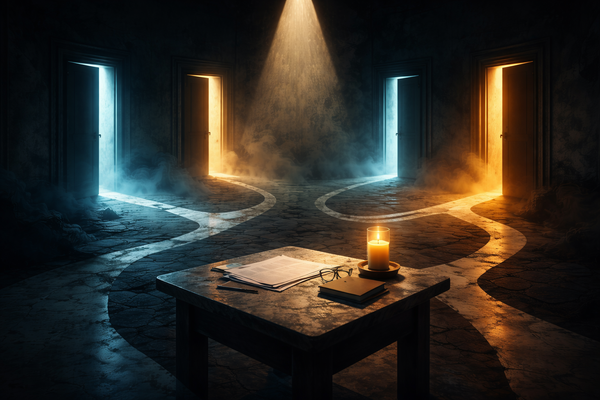Boundaries, Kindness, and the Myth of the Accessible Creator
How small creators get mistaken for best friends, therapists, and emotional support baristas

This morning, I got a message from a past reader that knocked the wind out of me a little. This person once followed my writing on Medium and eventually decided to support me over on Ko-Fi. As far as I knew, she was another woman writer, roughly my age. Someone I’d actually thought of fondly off and on over the past year, even though we'd only exchanged a few words of encouragement at the time.
Her words weren't the reason I got serious about creating for myself again this past spring, but they were definitely a reminder that there are people out there who genuinely appreciate what I do. So, when I recently decided to reintegrate my Ko-Fi page into my content production routine and saw her name on my feed from back then, I thought she might actually appreciate a quick comment letting her know that her words made a difference.
Nope.
The direct message I got back in response to my public comment was strangely unsettling. According to her, I ghosted her last year and broke her heart. She also accused me of reaching out for manipulative reasons. Apparently, she thought I was just trying to promote my blog, my newsletter, or both. (I wasn't. Oh, if only overt self-promotion came that easily to me!)
By the end of the message, I’d apparently destroyed her faith in all of humanity and single-handedly ensured she’d never reach out to another creator again.
And I just sat there blinking at the screen, trying to remember what crime I’d committed, because this was in no way a rational response to a quick "thanks for supporting me last year" comment.
I saw that past conversation as a quick, mutually enjoyable exchange that had ended perfectly naturally, as online conversations do. Meanwhile, she apparently thought it was a deeper, more intimate correspondence that was supposed to continue indefinitely.
It was jarring. But it also made me realize something about the weird shape of online relationships these days and how different it all feels compared to the early internet days when we were all just posting thoughts on LiveJournal for a handful of mutuals.
The Age of Accidental Celebrities
If you were online in the 2000s, you probably still remember when the internet felt like a bunch of tiny, overlapping living rooms. You could stumble into someone’s LJ, leave a comment, maybe "friend" each other, and by the end of the week, you might be trading music recommendations and inside jokes. Everyone was both creator and reader.
But now, even if your following could fit inside a Starbucks with room to spare, you scan as a public figure. The algorithmic machine doesn’t care that you’re actually just a tired freelancer with too many tabs open. It still packages you like a mini-celebrity, as absurd as that idea may feel.
That means your smallest acts of kindness — replying to a comment, saying thanks, answering a message, or even just appearing friendly or empathetic in your posts — can easily be misread as an invitation to something deeper.
I've been learning this the hard way since I relaunched my personal publications and started creating regularly again a few months ago. There was this incident over on Ko-Fi. Then, a couple of weeks ago, I had some strange man in Alabama randomly decide I was his soulmate and start e-stalking me the minute he discovered me on Substack. As far as the latter goes, I was actually concerned at one point that I might have to get the police involved.
And these are far from my only brushes with unnerving online parasocial connections over the years, just the most recent.
We live in a time where gratitude gets mistaken for intimacy. A quick “thank you so much!” can so easily turn into someone thinking, "we’re besties now." And when you inevitably go back to your actual life and stop replying (or decide something doesn't warrant a response), they feel abandoned, like a fan who never got their backstage pass.
The Mirror Problem
I actually understand that inclination more than I’d like to admit. I’ve felt the pang of wanting people I admire or only know at a distance online to eventually see me as a friend (or at least peer material). It’s very human.
But there’s a line between admiration and projection. Admiration says, “I love the way you see the world.” Projection says, “Because I see myself in you, you owe me something.”
That’s when things get messy.
It’s easy to forget that behind every post, every essay, every video, is just… a person. Not a character specially written to heal your loneliness. Not a therapist. Not a pen pal. Just a human being who probably needs to do their laundry and hasn’t eaten lunch yet.
Disappointment is inevitable sometimes. But entitlement is optional.
How to Keep Things Healthy for Everyone Involved
These recent brushes with parasocial attachment have gotten me thinking a lot about how we can all interact online without accidentally hurting each other or winding up in someone’s “villain origin story” folder. Here’s what I’ve come up with so far.
Keep it public
If you want to say something nice (as a creator or as a reader), leave it in a public comment instead of making it a private message. It still reaches them (trust me), and it leaves less room for misunderstandings. “I love your work” or "thank you for this" is always a good move. “Let's move this into private territory even though I don't know you” probably isn’t.
Say thanks, then move on
Send the compliment. Express gratitude. Let them know they helped you. Then stop there. You don’t have to build a relationship out of every moment of resonance. Sometimes a kind note is exactly enough.
Check your motives
Before reaching out, maybe ask yourself, "Do I want to connect, or do I really just want to be seen?" It’s an uncomfortable question, but a good one. Most of the time, what we really crave is recognition, not friendship, and that’s okay. But it's not fair to assign someone else the job of filling that gap.
Respect the curtain
If someone doesn’t reply or only interacts publicly, respect that. I promise you they’re not being rude. They’re protecting their sanity, which they have every right to do. Private correspondence often turns into emotional labor they didn’t sign up for, exactly why so many people simply don't "do" DMs at all.
Remember the human
Creators have entire lives outside the internet that are just as stressful and messy as anyone else's. Deadlines, family drama, bad days, grocery lists. A message might arrive on a day when their dog’s sick or their mom’s yelling or their brain’s just dog-ass tired. So, a response that's less than what you hoped for (or even total silence) probably has little to nothing to do with you.
The Mercy of Silence
I ultimately chose not to respond to this woman's message. Yes, it was jarring and hinted at a potential parasocial dynamic I hadn't picked up on previously. But I also honestly just felt sad for both of us.
She was hurt because she thought she’d lost a connection that never really existed, and I was exhausted by the renewed realization that no matter how small and inconsequential your online presence feels to you, someone out there might still turn you into a symbol without your knowledge or consent.
In light of that, silence felt like the best, safest, most merciful choice.
Because the internet’s really weird now. We’re all fumbling toward connection in a place that makes real intimacy harder, not easier. But the best any of us can do — creators and readers alike — is be kind and clear to the best of our ability. Appreciate each other’s work, but also respect the distance that keeps everyone safe and sane.
Because in the end, connection isn’t always about getting closer. Sometimes it’s just about seeing each other clearly, waving from across the digital garden, and letting that be enough.
If you're a creator (big, small, or just aspiring), how do you handle boundaries and discourage unhealthy attachment styles when it comes to your readers? Inquiring minds want to know.





